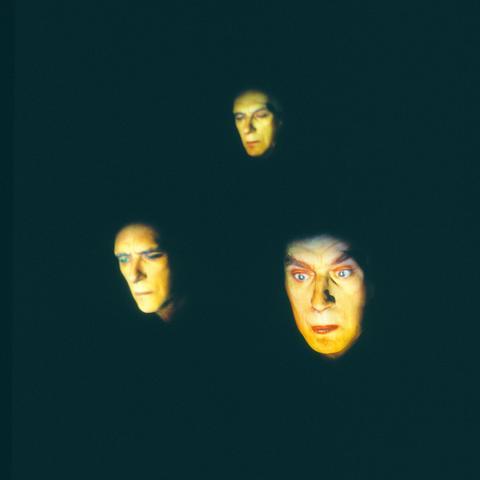Considering a majority of the productions in the 2004 International Theatre Festival have blurred the division between theater and performance art, it seems fitting that the final piece is one that features no live on-stage acting.
Challenging the traditional definition of theater with its projected video images in place of actors, the Canadian based Theatre Ubu delivers Maurice Maeterlinck's The Blind in an Asian premiere at the Experimental Theatre this weekend. Ubu director Denis Marleau's rendition of the 19th century Belgian play has received international recognition and performed sold out shows at both the Edinburgh International Festival and Festival d'Avignon.
The Blind is a static play with no action. It's about waiting, talking, and just existing. Using actors on stage is one way to present the text, using video is Marleau's, said Stephanie Jasmin Artistic, co-director of Theatre Ubu.

PHOTO COURTESY OF CKS CULTURAL CENTER
His version of the text, according to Jasmin, is the director's experiment with the playwright's theory of staging a play without actors. Maeterlinck discussed the idea of generating a presence without the physical presence of a person, she said.
The Blind examines the dilemma of 12 sightless men and women lost in a forest after their guide, a priest, has disappeared. As a symbolist, applying suggestion rather than direct statement to convey meaning in his work, Maeterlinck uses his blind and abandoned characters to embody humanity's dependence on the physical senses (in this case sight) in a world with no leader (political or spiritual).
On the director's instructions, only 56 spectators are permitted in the theater during each performance. The close environment is intended to establish an intimate relationship between the images and the audience. It will also limit the number of people colliding as they find their seats in complete darkness, creating a sense of blindness among the viewers.
Unfortunately capping the number of seats also limits the number of tickets, and as of Monday, tickets were all sold out.
The 45-minute show begins when faces projected onto masks move across the stage. Apart from their entrance at the start of the play, no other movement takes place. While Marleau's interpretation of the thought-provoking play quashes the potential for theatrical movement, the lack of action on stage is substituted for with captivating facial expressions and dialogue. The parts of the 12 characters are performed by the pre-recorded images and voices of two actors.
Marleau's disembodied heads will leave the audience to contemplate the themes of physical and emotional suffering in addition to thinking about what exactly it is that defines "live theater."
Performance notes:
Where: Experimental Theatre, National Theatre and Concert Hall, 21-1 Zhongshan S Rd, Taipei (
When: Tonight and tomorrow at 7 and 8:30pm with a late performance at 10pm tonight. Saturday and Sunday matinee performances at 2:30 and 4pm
Cost: NT$600. As of press time, all tickets were sold out. However there is always the possibility of no-shows for those willing to go early and wait.

June 9 to June 15 A photo of two men riding trendy high-wheel Penny-Farthing bicycles past a Qing Dynasty gate aptly captures the essence of Taipei in 1897 — a newly colonized city on the cusp of great change. The Japanese began making significant modifications to the cityscape in 1899, tearing down Qing-era structures, widening boulevards and installing Western-style infrastructure and buildings. The photographer, Minosuke Imamura, only spent a year in Taiwan as a cartographer for the governor-general’s office, but he left behind a treasure trove of 130 images showing life at the onset of Japanese rule, spanning July 1897 to

One of the most important gripes that Taiwanese have about the Democratic Progressive Party (DPP) is that it has failed to deliver concretely on higher wages, housing prices and other bread-and-butter issues. The parallel complaint is that the DPP cares only about glamor issues, such as removing markers of Chinese Nationalist Party (KMT) colonialism by renaming them, or what the KMT codes as “de-Sinification.” Once again, as a critical election looms, the DPP is presenting evidence for that charge. The KMT was quick to jump on the recent proposal of the Ministry of the Interior (MOI) to rename roads that symbolize

On the evening of June 1, Control Yuan Secretary-General Lee Chun-yi (李俊俋) apologized and resigned in disgrace. His crime was instructing his driver to use a Control Yuan vehicle to transport his dog to a pet grooming salon. The Control Yuan is the government branch that investigates, audits and impeaches government officials for, among other things, misuse of government funds, so his misuse of a government vehicle was highly inappropriate. If this story were told to anyone living in the golden era of swaggering gangsters, flashy nouveau riche businessmen, and corrupt “black gold” politics of the 1980s and 1990s, they would have laughed.

In an interview posted online by United Daily News (UDN) on May 26, current Chinese Nationalist Party (KMT) Chairman Eric Chu (朱立倫) was asked about Taichung Mayor Lu Shiow-yen (盧秀燕) replacing him as party chair. Though not yet officially running, by the customs of Taiwan politics, Lu has been signalling she is both running for party chair and to be the party’s 2028 presidential candidate. She told an international media outlet that she was considering a run. She also gave a speech in Keelung on national priorities and foreign affairs. For details, see the May 23 edition of this column,